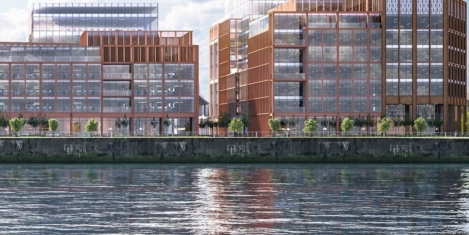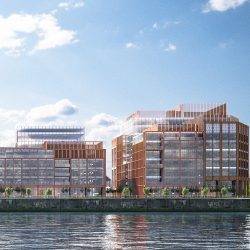August 1, 2018
New research suggests that the confidence gap between men and women is a myth
 The confidence gap between men and women is a myth, according to Laura Guillén, Professor of Organisational Behaviour at ESMT Berlin, because women viewed as self-confident aren’t more likely to get ahead. For women, gaining influence at work is more closely tied to their warmth and caring than the appearance of self-confidence. Laura’s research, in collaboration with Margarita May of IE Business School and Natalia Karelaia of INSEAD, examined high-performing workers in a male-dominated technology company that employs more than 4,000 people worldwide. The research also suggests women are expected to care for others on top of their workload, whilst men are held to a lower standard of key performance indicators.
The confidence gap between men and women is a myth, according to Laura Guillén, Professor of Organisational Behaviour at ESMT Berlin, because women viewed as self-confident aren’t more likely to get ahead. For women, gaining influence at work is more closely tied to their warmth and caring than the appearance of self-confidence. Laura’s research, in collaboration with Margarita May of IE Business School and Natalia Karelaia of INSEAD, examined high-performing workers in a male-dominated technology company that employs more than 4,000 people worldwide. The research also suggests women are expected to care for others on top of their workload, whilst men are held to a lower standard of key performance indicators.












 The majority of employees are disappointed with their company’s lack of investment in technology, and despite the fact three quarters (76 percent) want to request flexible working – almost half still don’t have the option of working more flexibly, a new report from a technology company claims. According to the survey by technology company Ingram Micro Cloud UK, in collaboration with technology company Microsoft, despite the fact that Millennials and Centennials are often thought to be the driving force behind changing workplace practices – and are often derided in popular discourse for having unreasonable and unrealistic expectations – the calls for change are coming from all segments of the workforce. However, 85 percent of Millennials admit to procuring their own workplace technologies such as instant messaging, Skype, file hosting and sharing tools (all available from Ingram Micro Cloud) that aren’t supported or provided by their employer, which raises major security issues, acco.
The majority of employees are disappointed with their company’s lack of investment in technology, and despite the fact three quarters (76 percent) want to request flexible working – almost half still don’t have the option of working more flexibly, a new report from a technology company claims. According to the survey by technology company Ingram Micro Cloud UK, in collaboration with technology company Microsoft, despite the fact that Millennials and Centennials are often thought to be the driving force behind changing workplace practices – and are often derided in popular discourse for having unreasonable and unrealistic expectations – the calls for change are coming from all segments of the workforce. However, 85 percent of Millennials admit to procuring their own workplace technologies such as instant messaging, Skype, file hosting and sharing tools (all available from Ingram Micro Cloud) that aren’t supported or provided by their employer, which raises major security issues, acco.


 Built environment organisations are calling for urgent action on issues such as consumption, innovation and infrastructure to prevent the UK slipping behind other nations on poverty, equality and the environment as a new report released today (3 July 2018) highlights the UK’s inadequate performance against the United Nations Sustainable Development Goals (SDGs), including those for the built environment. The report, Measuring up, from the UK Stakeholders for Sustainable Development (UKSSD), is the first comprehensive assessment of the UK’s performance against all 17 SDGs and highlights a significant danger that quality of life in the UK will worsen if action is not taken. Just some of the findings of the report include; that the UK is performing well (green) on only 24 percent of its targets; no industry, innovation and infrastructure targets have achieved a ‘good’ performance rating, with gaps in policy coverage and inadequate or deteriorating performance and large scale, sustained investment in replacing ageing infrastructure and creating additional resilient and low carbon infrastructure of all kinds is required.
Built environment organisations are calling for urgent action on issues such as consumption, innovation and infrastructure to prevent the UK slipping behind other nations on poverty, equality and the environment as a new report released today (3 July 2018) highlights the UK’s inadequate performance against the United Nations Sustainable Development Goals (SDGs), including those for the built environment. The report, Measuring up, from the UK Stakeholders for Sustainable Development (UKSSD), is the first comprehensive assessment of the UK’s performance against all 17 SDGs and highlights a significant danger that quality of life in the UK will worsen if action is not taken. Just some of the findings of the report include; that the UK is performing well (green) on only 24 percent of its targets; no industry, innovation and infrastructure targets have achieved a ‘good’ performance rating, with gaps in policy coverage and inadequate or deteriorating performance and large scale, sustained investment in replacing ageing infrastructure and creating additional resilient and low carbon infrastructure of all kinds is required.

















July 5, 2018
Why a Google office simply does not work for everybody 0
by Dr Caroline M. Burns • Comment, Facilities management, Technology, Workplace design
More →